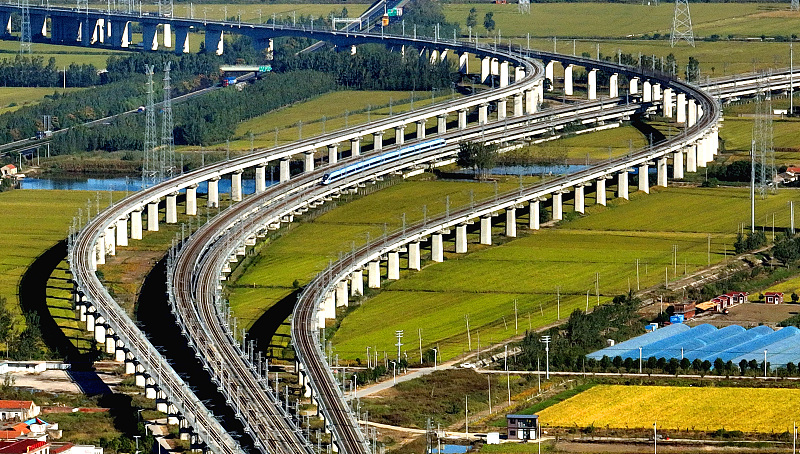A century's worth of growth for China's transportation
- By Jay Ian Birbeck
 0 Comment(s)
0 Comment(s) Print
Print E-mail China.org.cn, October 10, 2022
E-mail China.org.cn, October 10, 2022

The Ever Alot, the largest container ship ever built, sailed out of a Shanghai shipyard earlier this summer. The behemoth, constructed using only Chinese patents, is nearly as long as the Eiffel Tower and can transport 24,000 containers. Aside from these accomplishments, the Ever Alot was noteworthy for another reason: It completed China's nearly decadelong streak of record-breaking feats in the transportation sector.
Since the 18th CPC National Congress in 2012, China has pumped remarkable amounts of investment into its transportation network. In the past decade, China has completed the world's biggest airport in Beijing, opened the world's first autonomous high-speed railway (HSR) – which also includes the deepest and largest underground HSR station – and opened the planet's longest sea crossing stretching 55 kilometers across the Pearl River estuary.
Critics have disregarded many of these projects as wasteful and of little value. Advocates, meanwhile, point to the positive effects on the economy, the environment and society. So, has all of the investment been worthwhile?
The HSR network is a good place to start as it exemplifies this debate. The untiring expansion of China's HSR network, growing over 30,644 kilometers since 2012, is one of the country's most successful large-scale infrastructure initiatives. Thanks to innovative manufacturing techniques, the network is now the world's busiest and longest after just over a decade of development.
The HSR network offers definite advantages to Chinese citizens. Its comparatively low prices compared to air travel – just $70 for the 1,000-plus kilometer trip from Shanghai to Beijing – have drastically lowered the barrier to intercity travel, reducing pressure on the domestic aviation sector. The HSR has led to more people traveling between cities than ever before, helping facilitate a boom in domestic tourism.
The advantages of the system go far beyond convenience and tourism. According to the Paulson Institute, the HSR network has an annual return on investment of 6.5% and provides a net benefit to the Chinese economy of $378 billion. Moreover, the World Bank concluded that the network was financially viable and economically stimulating.
The success even helped China become the global leader in HSR and it has now begun shipping its trains, standards and technology abroad. In August, China delivered the initial shipment of trains for Indonesia's first HSR route after the Southeast Asian nation adopted several Chinese standards. The China-Laos Railway is another case in point, with an extension to Singapore in the works.
Meanwhile, in China's urban areas, a range of electric transportation systems have alleviated once-infamous traffic congestion in many Chinese cities and reduced air pollution by 40% from 2013 to 2020. New metro systems have been appearing in cities across China at an increasingly fast rate, and by 2021 a total of 40 cities had built subway lines. The construction boom has been ideal for manufacturers and increased economic output.
Above ground, a somewhat more straightforward kind of transportation has transformed China's metropolises. Shared bikes of every color line the streets, providing an affordable, environmentally friendly and congestion-easing option for getting around cities. Short-term bike sharing is a relatively new industry, but this has not stopped its rapid adoption in China. The two largest operators, Meituan Bike and Alibaba-backed Hellobike, did not even exist before 2015, yet their shared bikes have become an iconic characteristic of urban China.
Bike sharing has several advantages, including health benefits, reduced fuel use and financial savings for users.
Aiding the urban transformation, new energy vehicles (NEVs) are changing private vehicle ownership, public transportation and ride-hailing services to make them more sustainable. Several cities, such as Shenzhen, now operate taxi and bus fleets composed entirely of NEVs. In fact, above all the other transportation developments, China's growing dominance in the NEV industry may have the most significance in the years to come.
Ten years ago, the prospects for China's NEV industry were gloomy, with just seven of 25 Chinese cities fulfilling a goal of having 1,000 NEVs and hybrids on the road by 2012. China has since risen to the top of the global NEV sector and now leads industry research and manufactures the majority of the world's automotive batteries. NEVs are expected to become the dominant mode of transportation in the coming decades, so China's first-mover advantage in the industry is significant.
From cycling to electric cars, China's transportation system has changed dramatically in the last 10 years. The nation finishes the decade with the world's largest HSR network, longest highway network, most shared bikes, longest metro system and most extensive stock of NEVs.
It's no exaggeration to say that the country has crammed a century's worth of development and investment into a decade.
Meanwhile, the rate of change is showing no signs of slowing. Before 2035, China is looking to build a 100-kilometer sea tunnel across the Bohai Strait, guarantee one-day domestic deliveries and create an almost 2,000-kilometer ultra-high-speed maglev line linking Guangzhou to Beijing in three hours. Whatever achievements China makes in the coming years, they will be due to the formidable foundation it has laid over the last decade.
Jay Ian Birbeck is a freelance writer based in Guangzhou. He received an MSc in Digital Humanities from UCL.
Opinion articles reflect the views of their authors, not necessarily those of China.org.cn.
If you would like to contribute, please contact us at opinion@china.org.cn.







Go to Forum >>0 Comment(s)